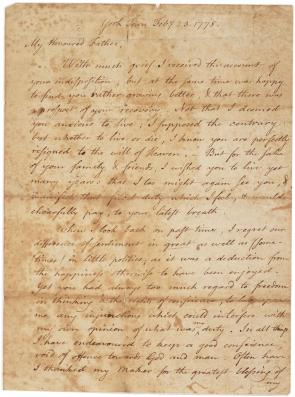A patriot’s letter to his loyalist father, 1778
A Spotlight on a Primary Source by Timothy Pickering Jr.
 In February 1778, Timothy Pickering Jr. received word from Massachusetts that his father was dying. An adjutant general in George Washington’s Continental Army, Pickering wrote his father this moving letter of farewell on February 23, 1778, from his post in Yorktown, Virginia. Born and raised in Salem, Massachusetts, a graduate of Harvard, and a successful lawyer, Timothy Pickering Jr. revered his father but disagreed with him on one critical issue: colonial independence from Great Britain. Timothy Jr. supported resistance to British rule, while Timothy Sr. remained a staunch Tory.
In February 1778, Timothy Pickering Jr. received word from Massachusetts that his father was dying. An adjutant general in George Washington’s Continental Army, Pickering wrote his father this moving letter of farewell on February 23, 1778, from his post in Yorktown, Virginia. Born and raised in Salem, Massachusetts, a graduate of Harvard, and a successful lawyer, Timothy Pickering Jr. revered his father but disagreed with him on one critical issue: colonial independence from Great Britain. Timothy Jr. supported resistance to British rule, while Timothy Sr. remained a staunch Tory.
The Revolution frequently divided families, but, as this letter indicates, the bonds of affection between Timothy Jr. and Sr. were never broken. "When I look back on past time, I regret our difference of sentiment in great as well as (sometimes) in little politics; as it was a deduction from the happiness otherwise to have been enjoyed," Timothy wrote his father. "Yet you had always too much regard to freedom in thinking & the rights of conscience, to lay upon me any injunctions which could interfere with my own opinion of what was [inserted: my] duty . . . Often have I thanked my Maker for the greatest blessing of my life—your example & instructions in all the duties I owe to God, and my neighbour."
Timothy Pickering Sr. died in June 1778. Two years later, General Washington promoted Timothy Jr. to quartermaster general. He would go on to serve as secretary of state under Presidents Washington and Adams. Pickering prominently opposed US neutrality in European wars—a policy favored by Washington and Adams—which led to his dismissal from the Cabinet in 1800. Later elected to Congress, he became the first US senator censured by the Senate, for publically sharing a classified document in an effort to prove that James Madison had acted unconstitutionally in claiming part of Florida for the United States. Pickering and his wife, Rebecca, had ten children, one of whom wrote his father’s biography in 1867. Timothy Pickering Jr. died in 1829 in Salem.
A full transcript is available.
Transcript
York Town Feb.y 23. 1778.
My Honoured Father,
With much grief I received the account of your indisposition; but at the same time was happy to find you rather growing better, & that there was a prospect of your recovery. Not that I deemed you anxious to live; I supposed the contrary: —but whether to live or die, I know you are perfectly resigned to the will of Heaven.—But for the sake of your family & friends, I wished you to live yet many years: that I too might again see you, & manifest that filial duty which I feel, & would chearfully pay, to your latest breath.
When I look back on past time, I regret our difference of sentiment in great as well as (sometimes) in little politics; as it was a deduction from the happiness otherwise to have been enjoyed. Yet you had always too much regard to freedom in thinking & the rights of conscience, to lay upon me any injunctions which could interfere with my own opinion of what was [inserted: my] duty. In all things I have endeavoured to keep a good conscience, void of offence towards God and man. Often have I thanked my Maker for the greatest blessing of my life—your example & instructions in all the duties I owe to God, and my neighbour. They have not been lost upon me; tho’ I am aware that in many things I have offended, & come short of my duty. For these things I am grieved; but not as those who have no hope.
I am deeply indebted too for your care in my education; I only regret that I improved my time no better.
But altho’ the line of action I have pursued has not always been such as you would have chosen; yet (but I boast not) in regard to religion and morality, I hope you have never repented that I was your son. By God’s grace I will in my future life aim at higher attainments in those all-essential points; not only from a sense of duty to my Creator—from a regard to my own happiness here and beyond the grave—but that I may never wound the breast of a parent to whom I am under so many and so great obligations.
My love and duty to you and my mother,
conclude me your obedient son,
Tim. Pickering junr:
To Mr. Timo. Pickering
